- Home
- Craig Schaefer
Harmony Black (Harmony Black Series Book 1) Page 3
Harmony Black (Harmony Black Series Book 1) Read online
Page 3
Even then, I knew better. The word safe never meant anything to me after that night, ever again.
“Officer Barry?” I said, clutching the hot mug between my tiny hands as he stood to leave.
“Yeah, hon?”
I looked up at him. “It was the Bogeyman.”
He just shook his head and gave me a sad smile.
“It was just a bad man, sweetie.” He tapped the star on his chest. “This badge means it’s my job to find bad people and make them go away so they can’t hurt anybody else. And that’s exactly what I’m going to do.”
He never did, though. That was the last kidnapping in Talbot Cove. The case went cold, then it gathered dust, then it rotted away in the dark.
“And that was the end of it,” I told them. “Mom’s family had some money, and roots in Long Island, so we moved out of town about a year later. I’ve never been back.”
“You’ve been waiting a long time for this,” Jessie told me. It wasn’t a question.
I thought about it. Nodded. “Suppose I have.”
“Distressingly,” April said, “this isn’t the creature’s second emergence. Kevin?”
The projector flickered. My father’s face disappeared from the wall, replaced by an older, faded, and yellowed front page from the Great Lakes Tribune. The headline trumpeted the triumph of Allied powers against the Nazi war machine, but Kevin slid the focus to a column buried farther down the page.
Talbot Cove Infant Stolen from Crib;
Second Abduction in a Week Stokes
Local Fears
“I went back as far as I could,” Kevin said, “but this is the last time I found anything concrete. This has been happening since at least the 1940s. It comes out, snatches a handful of kids, then goes dormant again. No telling what it does with them. I mean, I could think of some possibilities, but . . . ”
He trailed off, looking my way. I rested my palms on the table.
“We need to get something straight right now,” I said. “One, I’m not made of porcelain. Two, I finished mourning my sister’s death a long, long time ago. If any of you feel like you can’t say something in front of me, that means we won’t be able to work together. And that’d be a damn shame, because right this minute, while you tiptoe around the truth, there’s a missing kid out there who needs us. I’m here to help. Let me.”
Nobody said anything for a moment.
Jessie nodded slowly, her lips curling into an amused smile. “All right. Respect. Kevin, what else have you got for us?”
“Something freaky,” he said, typing away and pulling up a neatly organized spreadsheet. “While I was combing the newspaper archives, I mostly looked at police blotters, right? Well, I noticed that when the creature is active, the blotters got bigger. And, well, kinda samey.”
“What are we looking at?” Jessie said. Beside her, April leaned in, her eyes widening.
“It’s not just kidnapping kids,” Kevin said.
FOUR
“This is a sampling of crime statistics from Talbot Cove before, during, and after the 1980s incident, and from last month through yesterday,” Kevin said.
I had a degree in forensic accounting, but I didn’t need it to read these numbers. They laid it all out, crystal clear.
“The crime rates spike,” I said.
Kevin nodded. “I know, right? This is a sleepy little town in the middle of nowhere. Not exactly a hotbed of violence and vice. But in both cases, starting about a week before the first abduction, you see a distinct rise in criminal activity.”
“Specific crimes,” April mused. “Domestic violence, battery, child abuse. Crimes against family. Look: burglary and theft? Doesn’t change one bit. Homicide rises a little bit, and I’d wager those are all cases of someone murdering a family member.”
“Way ahead of you, Doc. I already checked, and that’s a bingo. Near as I can tell, while our target is awake and hunting, anybody with a predisposition to take a swing at their spouse and kids finds it a lot harder to hold back. Case after case: it’s repeat offenders, even some people who were in therapy for years. This thing is influencing people’s minds across an entire city.”
“Baltimore all over again,” Jessie muttered. She looked my way and added, “Demon possessed a mall cop, right around Christmas shopping season. Shoppers started getting Ebenezer Scrooge levels of greedy, like, shanking one another over the last discount TV set.”
April picked up her pen and flipped to the next page of her notebook, jotting down a few quick words.
“This is good information,” April said, “but it doesn’t bring us closer to finding the target. We know what it does. We need to know why.”
“Are we agreed—” Kevin said, then paused. He shot a guilty look my way. I arched an eyebrow at him. “Are we agreed, um, that it’s most likely using the kids for a, uh, food source? I mean, since we’ve never found any bodies.”
I held his gaze. “That’s my theory.”
“Law of averages,” Jessie said. “Considering how many critters we’ve seen that just love a good people snack, it’s pretty likely this one does, too.”
Kevin relaxed a little. “Okay, so, what if it’s literally hibernating? Hedgehogs and bears sleep through the winter after fattening up. Heck, there’s a recorded case of a bat in captivity hibernating for almost an entire year. This is just . . . a supersize version.”
“One flaw,” April said. “If food is the drive, why children and infants? We know it’s capable of killing a full-grown adult with ease. Bigger prey means less work and more meat.”
The table fell silent as we retreated into our own heads. I stared at the spreadsheet projected onto the wall, searching for some detail I’d missed, something to offer.
“It’s not a ritual,” April said. “Not a compulsion.”
I looked her way. “How do you mean?”
“Nothing is repeated, except the abductions themselves. There’s a bigger gap between the first hibernation than the second, by almost a decade. The first time, it took six children. In the ’80s, it took five. The abductions occur over a period of two to three weeks, with seemingly random gaps between incidents. Harmony, when it spoke to you, did it seem . . . surprised? It couldn’t have known you’d walk in on it.”
I thought back, picturing it in my mind. That first approach, when I thought it was my mother, and how focused it was on Angie.
“Yes. It hesitated. That’s when it held out its hand, and tried to get me to go with it.”
“It changed its plans, spontaneously.” April frowned. “It is sentient, it is an opportunist, and it is not bound by ritual or compulsion. That’s not good.”
“Doesn’t make our job any easier,” Jessie said, “but it’s still our job. Talbot Cove’s a three-hour drive from here. Let’s pack up and roll out.”
Down in the dimly lit garage under the building, Jessie twirled a set of keys on a plastic tag and checked license plates.
“All right, let’s see what they gave us to drive. I’m feeling lucky this time. C’mon, Dodge Charger, it’s gonna be a Dodge Charger—”
We came to a dead stop in front of a paste-white Crown Victoria, its bug-spattered license plate about ten years newer than the rest of the car. An entire quarter front panel was a slightly different color than the rest of the body, and the driver’s-side door sported a long, jagged scar in the paint, like someone had raked their keys along it.
“Every time,” Jessie said, deflated. “They do this to us every time.”
Kevin patted her shoulder. “Sorry, boss.”
April pushed her wheelchair past them, rolling around to the side of the car. Kevin helped her into the backseat, holding her wheels steady while she pulled herself into the car; then we collapsed the chair and stowed it in the trunk.
Jessie tossed me the keys. “You drive. My enthusiasm is suddenly diminished.”
I’d been gone for thirty years, but once we put Detroit in the rearview mirror, Michigan looked exactly the way
I’d left it. We drove through wild woods just feeling the first kiss of fall, the leaves turning crimson and gold, and past sleepy, hilly towns that hadn’t changed since the ’50s. Eventually we hit the coast of Lake Michigan, the highway turning to follow its curves, and the slowly setting sun gleamed like molten gold on the water.
Twenty minutes and I’d be home again.
The digital clock on the dashboard felt like the countdown timer on a bomb. I tried to distract myself from the inevitable, but all I had was static-choked talk radio and the incessant typing sounds from the backseat as Kevin hammered away on his laptop keyboard.
“So why are you called the Circus?” I asked, aiming the question at nobody in particular.
Sitting beside me, after spending the last hour in a light slumber, Jessie’s eyes snapped open. “Hmm?”
“Linder, he said your cell designation was ‘Circus.’”
“Because he’s a jackass,” Jessie said.
“Because we fight evil clowns,” Kevin said. “Well, okay, it was just that one time, but once was enough. Eeh, creepy.”
“Because,” April said dryly, “our reputation for results far exceeds our reputation for following protocol. It makes for messy reports, which Mr. Linder must then explain to his superiors.”
“They love us and they know it,” Jessie said. She wriggled a little in her seat, put her head back, and closed her eyes again. “Considering the scuttlebutt about what went down in Vegas, you should fit in just fine.”
I gripped the hard plastic steering wheel a little tighter.
“That’s not how I normally operate. I do things by the book.”
In the rearview mirror I saw April shake her head, a slight smile on her lips.
“Oh, dear,” she said, “an idealist in our midst. I almost remember what that feels like. Suffice to say, Harmony, that works only when confronting a situation that’s in the proverbial book. Outside the margins, improvisation is key. We operate under special circumstances. Can you think on your feet?”
I nodded slowly. “I do all right.”
“Then we’ll get along just fine.”
The sun was nothing but an orange glow on the horizon when we hit the outskirts of town. A big forest-green sign at the side of the road read, WELCOME TO TALBOT COVE: THE TOWN THAT WORKS! POPULATION 2,032.
“Yikes,” Kevin said, glancing up from his laptop. “Kind of place where everybody knows your name, huh?”
I just shrugged and said, “Small-town America.”
We cruised down Main Street, a row of mom-and-pop stores in sturdy Midwestern brick, most of them already closed up for the night. The modern world had to force its way into Talbot Cove through the cracks, one piece at a time: I smiled at the sight of a PC café rubbing shoulders with a thrift store and a TV-repair shop.
In the distance, out toward the water, the tall scaffolding and smokestacks from the old paper mill rose up over the town. The crimson glow from the setting sun turned them into silhouettes of skeletal fingers, grasping at the sky.
“Find us a base camp,” Jessie said, and I obliged. The Talbot Motor Lodge was right where I remembered it, a sleepy one-floor motel nestled on the outskirts of town and flanked by clumps of towering oak trees. A cartoon owl loomed over us from a lit plastic sign, its claws perching on a placard that offered HBO and a heated swimming pool.
The Circus might play fast and loose with the regulations, but even Jessie Temple wasn’t about to break the Bureau’s rules on travel expenses. We doubled up, renting the two rooms on the far end of the motel.
“All right,” Jessie said to April and Kevin, stretching like a cat as she clambered out of the car. “You two set up here while Harmony and I introduce ourselves to the local legal beagles.”
“Does setting up include dinner?” Kevin asked, pulling April’s wheelchair out of the trunk.
“Order some pizzas. And get receipts. I mean it.”
The police station was a squat gray concrete shoe box with three late-model Fords parked out front. They shared a lot with the Talbot Cove Library on one side and the town hall on the other, a colonial building topped by a redbrick clock tower.
“Memories coming back?” Jessie asked me.
I looked up at the clock tower, cold and still in the gathering dark, and shook my head. “Vaguely? I mean, I was six when we left town. I . . . recognize these places, I know most of the streets, but they don’t mean anything to me. They’re just places.”
Inside the police station, an elderly receptionist sat behind a rolling desk and paged through a back issue of People magazine. We held out our badges, letting her take her time looking them over.
“FBI, ma’am,” I said. “Special Agents Temple and Black. May we speak to the sheriff, please?”
“He’s in back,” she said. “I’ll go fetch him.”
She left us alone in the lobby, standing under stark yellow fluorescent lights. Jessie wandered, checking out the notices on the community bulletin board. She let out a low whistle.
“Uh-oh. Looks like some kids have been playing mailbox baseball out on Route 7. We got here just in time.”
“Are you always this flippant?” I asked her.
She looked back at me. Smile gone. Eyes frozen.
“It’s a coping mechanism,” she said, her voice flat, “for spending a career wading through the worst shit the human mind can come up with, and then some. What’s yours?”
I took a step back and shrugged, looking down at the scuffed linoleum.
“I . . . I don’t.”
“You don’t have a mechanism,” she said, “or you don’t cope?”
I was still trying to answer that when the door behind me swung open and a big voice boomed, “Harmony!”
I turned on my heel and couldn’t help but smile. Barry looked just like I remembered him the night my father died, but he’d put on two things: another forty pounds, and my father’s sheriff star.
FIVE
“It is you,” Barry said, beaming. “Last time I talked to your mama, years ago, she said you were going into the academy. When Mabel said an Agent Black was here to see me . . . man, I was hopin’, and my hopes were answered.”
“Hey, Barry. You running this town now?”
He grinned and tapped his star. “That’s Sheriff Hoyt to you, young lady, and . . . no. No, I most certainly do not. Damn council’s cut my budget to a shoestring, and they’re still sharpening their knives. Hey, can FBI agents give hugs?”
“We can only hug sheriffs,” I said. “It’s a firm rule.”
He pulled me into a bear hug, slapping my back with his meaty hand.
“Look at you,” he said, pulling back. “Just look at you. Your dad would be so damn proud.”
“I do my best. Barry, this is—”
“Jessie Temple,” she said, sweeping in and offering her outstretched hand. “I don’t hug.”
“Handshake’s just as good,” he said. “I’m glad you girls are here. Town’s going goddamn crazy and I’m at wits’ end trying to keep the regular troublemakers in line, let alone find this kid.”
Jessie and I shared a glance. “Regular troublemakers?” I asked.
“And the irregular ones, too.” He paused, glancing toward the back hallway and giving a wave. “Hey, Cody! C’mere, see who came to visit.”
He walks like a cowboy, I thought. Cody had a little of that old-fashioned swagger, like an Old West hero on his way out of the saloon and headed for a high-noon showdown. Don’t worry, his body language said to the world, I’ve got this handled.
He had high chiseled cheekbones and broad shoulders that filled out his beige uniform shirt, but that’s where the comparison ended. Instead of a gunslinger’s scowl, he wore a bright-eyed smile, and the smile only got bigger when he looked my way.
“I’ll be damned,” he said. “Harmony?”
I just tilted my head. He looked so familiar, but I just couldn’t place his face, like the opening bars of an old hit song you can’t quite r
emember.
“Cody,” he said, “Cody Winters. You probably don’t remember, but before—before your family moved away—I lived right next door. My mom said we were pretty much inseparable.”
“Your first girlfriend,” Barry quipped. “First and only time in your life you had good taste in women.”
“Cody,” I said, paging through faint memories distorted by time. I remembered a game of hide-and-seek on a long summer afternoon, and the smell of fresh-cut grass.
“I heard you joined the Bureau.” Cody looked me up and down. “Gotta say, it suits you. No pun intended.”
“Tell ’em about Oscar McKinney,” Barry said.
Cody let out a long, low whistle. “You remember him? Runs McKinney Drugs over on Main Street? Check this out: he’s been clean and sober for twenty years, okay? Last night he went out, downed a whole fifth of cheap whiskey, and beat his wife and kid straight into the hospital.”
“She might lose one of her damn eyes,” Barry added. “Now, how do you explain that? But that’s not what you’re here for. I’ll tell you, this Gunderson woman? She’s a real piece of work.”
“How so?”
“Fakes a kidnapping, stashes her own kid God knows where, and you know what she says when we show her the nanny cam recording? ‘That’s not me.’ That’s it. That’s her whole defense. I just can’t figure what she’s trying to get out of this whole thing. Attention?”
“That’s what we’re here to find out,” Jessie said. “Can we talk to her?”
“Follow me,” Cody said. “Want me to set her up in the interview room?”
Five minutes later, Jessie and I sat across a steel table from a very frightened woman. Her stringy hair fell over her face, and her eyes were a teary, bloodshot mess. She didn’t sit so much as huddle, hunching forward, keeping her hands clenched in her lap and her arms squeezed tight at her sides.
The room was barely bigger than a walk-in closet, lit by a single hooded bulb over the table. Barry left us alone with her.
“Ms. Gunderson,” Jessie said, “we’re with the FBI. We’d like to talk to you about your son.”

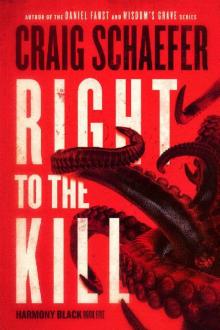 Right to the Kill (Harmony Black Book 5)
Right to the Kill (Harmony Black Book 5)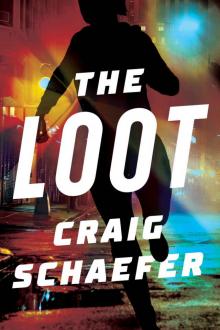 The Loot (Charlie McCabe Thriller)
The Loot (Charlie McCabe Thriller)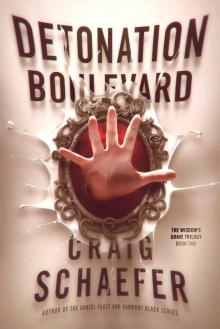 Detonation Boulevard
Detonation Boulevard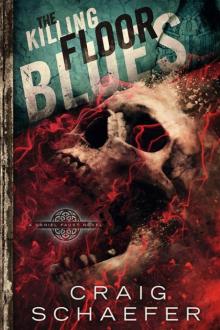 The Killing Floor Blues (Daniel Faust Book 5)
The Killing Floor Blues (Daniel Faust Book 5)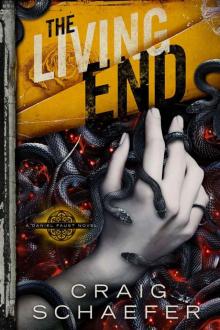 Daniel Faust 03 - The Living End
Daniel Faust 03 - The Living End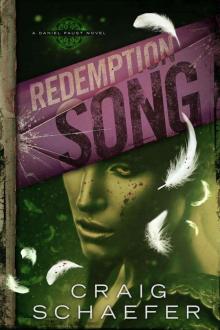 Redemption Song (Daniel Faust)
Redemption Song (Daniel Faust)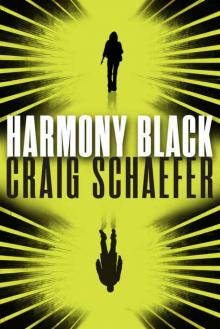 Harmony Black (Harmony Black Series Book 1)
Harmony Black (Harmony Black Series Book 1)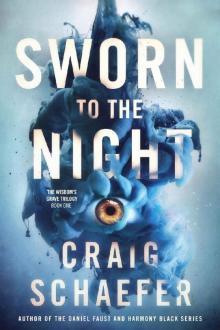 Wisdom's Grave 01 - Sworn to the Night
Wisdom's Grave 01 - Sworn to the Night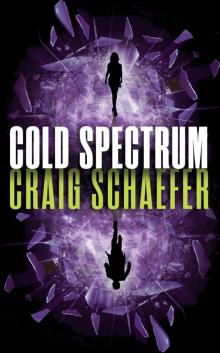 Cold Spectrum
Cold Spectrum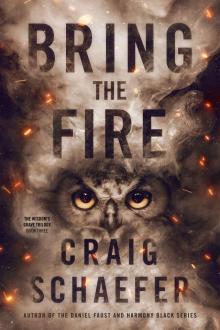 Bring the Fire (The Wisdom's Grave Trilogy Book 3)
Bring the Fire (The Wisdom's Grave Trilogy Book 3)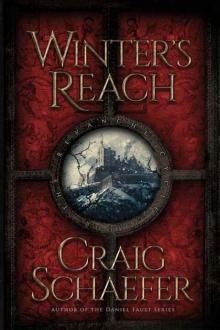 Winter's Reach (The Revanche Cycle Book 1)
Winter's Reach (The Revanche Cycle Book 1)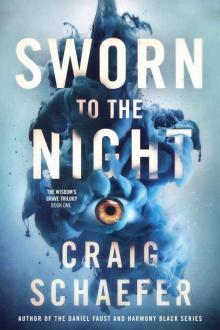 Sworn to the Night (The Wisdom's Grave Trilogy Book 1)
Sworn to the Night (The Wisdom's Grave Trilogy Book 1)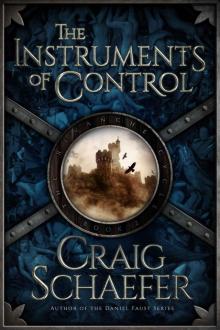 The Instruments of Control (The Revanche Cycle Book 2)
The Instruments of Control (The Revanche Cycle Book 2) Terms of Surrender (The Revanche Cycle Book 3)
Terms of Surrender (The Revanche Cycle Book 3)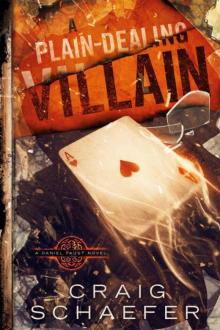 A Plain-Dealing Villain
A Plain-Dealing Villain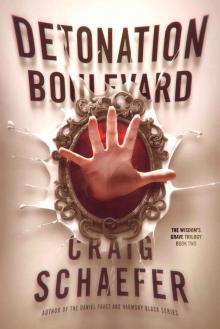 Detonation Boulevard (The Wisdom's Grave Trilogy Book 2)
Detonation Boulevard (The Wisdom's Grave Trilogy Book 2)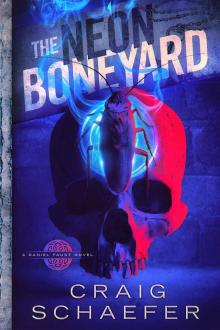 The Neon Boneyard
The Neon Boneyard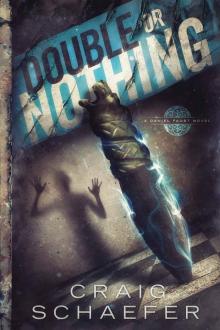 Double or Nothing (Daniel Faust Book 7)
Double or Nothing (Daniel Faust Book 7)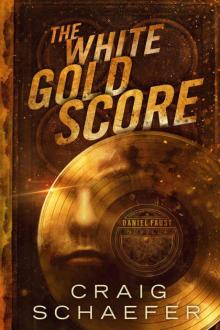 The White Gold Score (A Daniel Faust Novella)
The White Gold Score (A Daniel Faust Novella)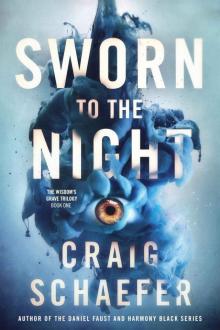 Sworn to the Night
Sworn to the Night